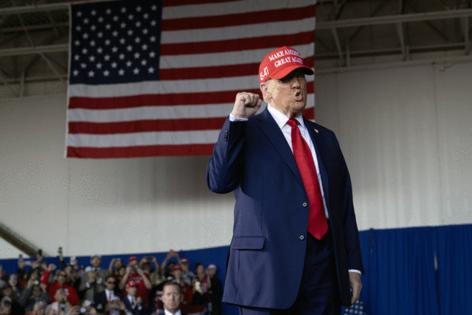Editorial: Election denialism could spark violence after a close race
Published in Op Eds
Donald J. Trump is rightly being criticized for his threat that, if elected, he would deploy the National Guard and the military against “the enemy from within,” a term he has applied to political opponents such as Rep. Adam B. Schiff and former House Speaker Nancy Pelosi.
Trump’s defenders argue that his threat concerned only what House Speaker Mike Johnson called “marauding gangs of dangerous, violent people.” And Trump, after much coaxing from a Wall Street Journal columnist to “clarify” his previous comments, told the newspaper’s editorial board that he wouldn’t use the military against his political opponents.
Yet there is a more immediate danger from another feature of rhetoric coming from Trump, his running mate Sen. JD Vance and top Republican supporters: election denialism. After seeming to acknowledge that he lost to Joe Biden “by a whisker,” Trump retreated to his old falsehoods about the 2020 election in his Sept. 10 debate with Vice President Kamala Harris.
The former president has since suggested that he would lose to Harris this year only if there is fraud. “They cheat,” he told a crowd at an Oct. 6 rally in Wisconsin. “That’s all they want to do is cheat. And when you see this, it’s the only way they’re going to win.”
The myth of election fraud seems to have stoked distrust of the electoral system among many Trump supporters. Polls suggest that many of them have concerns that the 2024 election will be marred by fraud. It also could serve as a manifesto for the most extreme MAGA supporters if Trump narrowly loses the election.
The riot at the U.S. Capitol on Jan. 6, 2021, is proof that lies can inspire Trump’s most unhinged supporters to engage in violence. Fortunately, the official counting of electoral votes has been designated a “National Special Security Event,” and afforded the same level of security as presidential inaugurations and political conventions.
What about election day? Experts believe that violence at polling places on Nov. 5 is unlikely, and steps have been taken since 2021 to protect polling places and sites where votes are counted.
But sadly the possibility of election day violence can’t be discounted completely, given the level of threats and harassment aimed at election officials. Some school districts whose campuses are used as polling centers have gone so far as to cancel classes on Nov. 5.
The greater danger in the event of a close election might be violence or intimidation directed against election workers and state officials in the period between Nov. 6 and Jan. 6, 2025.
Suppose, as in 2020, early election returns reflecting in-person voting create a “red mirage” suggesting a Trump victory. But then mail-in ballots counted later alter the outcome in favor of the Democratic candidate. There would be nothing improper about such results, but Trump supporters primed to be suspicious of the system might assume that there was foul play — and overreact, perhaps violently.
That is why Trump’s self-interested disparagement of the election system has been so corrosive, absurd as some of his claims are. (He has asserted, for example, that he would win California “if we had an honest vote counter.”) On Monday, in response to a question at a news conference, Trump said he hadn’t seen evidence of cheating — though he ominously added: “Unfortunately, I know the other side, and they are not good.”
“The No. 1 variable that increases election violence is political leaders alleging election fraud,” said Rachel Kleinfeld, a senior fellow in the Democracy, Conflict and Governance Program of the Carnegie Endowment for International Peace.
Better late than never, Trump should stop sowing doubt about voting and put aside any thought of responding to a loss in a close election with spurious claims of fraud.
_____
©2024 Los Angeles Times. Visit at latimes.com. Distributed by Tribune Content Agency, LLC.




























































Comments